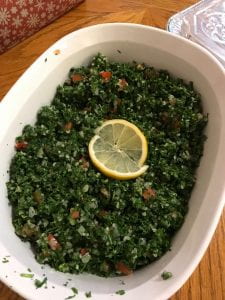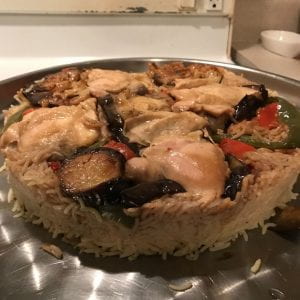At about 2 weeks in to my In-Depth project I’ve met with my mentor and prepared the three course meal I planned to. One weekend, we spent a day together and cooked all three Iraqi dishes:
Dish 1: Appetizer
The appetizer I made is called ‘tabbouleh,’ a type of Arab salad made predominantly of parsley. Added to it was tomato, onion and lemon juice, as well as a type of wheat called bulgur. Tabbouleh was the easiest three of the dishes to make, however cutting the parsley to the small size they had to be was a bit difficult. Definitely something I’ll be working on.

Dish 2: Main
The main meal I made is called ‘maqluba,’ meaning ‘upside-down’ in Arabic. It’s a dish made of rice, shallow-fried vegetables and a meat of choice. It’s all put together in a single pot with potato as the bottom layer, followed by the boiled meat and topped with the remaining vegetables and rice. Once packed and layered you take the pot and flip it upside down (hence the name) so that the rice is on the bottom of the plate and the chicken on top. When my mentor I made maqluba with potato, eggplant, tomato, green peppers and chicken. Flipping the pot was a bit difficult, and parts of the rice base broke off. So that’s something I’ll have to practice with the next times I make this particular dish.

Dish 3: Dessert
The dessert I made was baklava. Baklava is a fairly common pastry dessert, usually covered in syrup with ground nuts as the filling. A twist with the pistachio/walnut baklava I made with my mentor, was that we drizzled honey overtop of the cooked pastries instead of syrup, cutting the sweetness. Baklava pastry has to be kept moist, otherwise the pieces will stick and pulling them apart without them breaking becomes impossible. A couple of the pastry pieces became unusable due to this when I made this dessert, so that’s something I’ll need to watch for.

~
A recipe has no soul. You, as the cook, must bring soul to the recipe. – Thomas Keller
This quote by Thomas Keller is quite accurate to sum up my experiences and challenges from these past two weeks. In the classic way of recipe sharing between families and close friends, there wasn’t a hardcopy recipe as I had thought there would be. My mentor, having gained her her experience from her mom, memorized how to make these dishes from the ingredients and measurements down to cook times. It was a bit hard for me at first when I began cooking the dishes, wondering how I would make them without a recipe, but my mentor was able to explain the meals in a way that I began to memorize the preparation process as well. With mental notes and careful memorization of the meal preparation I saw, I’d say that I’ve memorized the majority of how to make the dishes. A few ingredient measurements I’m still unsure of, but after clarifying them with my mentor I’m sure I will remember the ‘recipe’ fully.
When I spoke to my mentor about the times she spent cooking with her mom, she said how she loved the experience, and how she’ll pass on the knowledge she gained to her own daughters. There’s something about sharing recipes between a family that gives the food you make a sense of vitality and life. It holds experiences, years of heritage within it. And that’s only amplified in my opinion when you’re taught on a personal level that causes you to know the recipe by heart.
~
Thus far wisdom I learnt from my mentor was how to put these dishes together ingredients wise and method wise. I’ve also been practicing the necessary skill of recipe memorization when making these dishes. My mentor also imparted some wisdom about Iraqi food and culture in general, teaching me about different Iraqi street foods and beverages, and on the cultural side she taught me a bit about Iraqi architecture, specifically some of the churches they have in Iraq.
As for facilitation strategies, I learnt a trick in forming the base for the baklava. Because the pastry for this dessert is very fragile, using a thin rod, for example a rod from a flag like I used, is really helpful to get the creased texture while keeping it from splitting. Tricks like these would help me develop as a mentor because, by passing them along, I will be able to facilitate the improvement process of any mentee I may have in the future.
~
My project has been going really well, and I’m progressing at the speed I hoped. What I learnt about Iraqi dishes is that taste is more key than presentation. Because of the colours and ingredients used in them, the dishes naturally have bright colours and an interesting look. So when it comes to the latter aspect of presentation, I’ll be testing different methods of such myself. That will be one of my main focuses as I progress with this project as I practice to remake and perfect these Iraqi dishes.